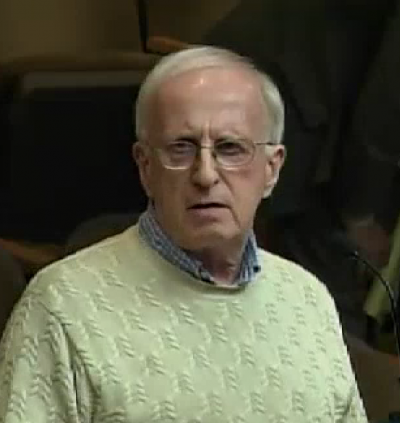
Phil Poe has served as Five Points CAC chair, Raleigh CAC chair, member of the UDO Advisory Group and neighborhood leader for the conversion of the Glenwood-Brooklyn neighborhood to a historic district. Phil recently spoke during the February 28 meeting of the Council’s Safe, Vibrant, and Healthy Community Committee. They were discussing Rezoning Z-54-22: Peace & West where the applicant wants to go from 12 stories to 30 stories. The site is located 250 feet, approximately 1/2 block, from the eastern boundary of the neighborhood.
Phil was involved throughout the 10-year process which produced the new comprehensive (long-range) plan and the new development regulations (Unified Development Ordinance or UDO). Although he was complimentary of the process used to develop and implement the new long-range plan and regulations, he considers many of the recent approvals for high-rise buildings irrational and inconsistent with city plans.
During the review of the UDO, Phil recalled a meeting of the Planning Commission on January 6, 2015. It was a 40-minute conversation among the planning commissioners about building heights in and around the downtown business district. Steve Schuster and Rodney Swink, both highly respected architects, spoke eloquently about the importance of context. Ken Bowers, the project leader for the rewriting of the comprehensive plan, displayed and talked about a map that incorporated the objectives and policies in the comprehensive plan into a visual format. The map clearly showed height tapering down from 40 stories in the city’s core around Fayetteville Street to 3 to 5 stories where the downtown district intersects with downtown neighborhoods. Steve Schuster made additional comments about the need to protect our historic neighborhoods since they contribute significantly to the overall character of the city. Phil expressed disappointment in the current lack of emphasis on context and wonders if context matters any more. He also wonders if approved plans matter any more. The city has the comprehensive plan and a more detailed downtown plan, yet major exceptions are being made all the time.
Prior to the rewriting of the comprehensive plan and after a controversial rezoning case, Phil recalled George Chapman, director of the Planning Department, bringing together a group of developers, land use attorneys and neighborhood leaders. He was looking for recommendations that would help eliminate all the controversy associated with so many rezoning cases. The group agreed a fair and predictable process would really help.
With the implementation of the new comprehensive plan and UDO, Phil believed there was a real opportunity for a more predictable and efficient process. Today, unfortunately, rather than following approved plans, everything seems negotiable. This undermines the whole idea of predictability and erodes the trust in the review processes and in city leadership.
Livable Raleigh has reached out to Phil Poe, and he has agreed to talk more about capacity planning, performance reporting, and other processes he considers essential to the growth of a highly successful city. Look for future blogs on those topics.
Related information:
If you appreciate the kind of reporting we bring to you
|
Please donate $10 or $20, Thanks for supporting |
 |

